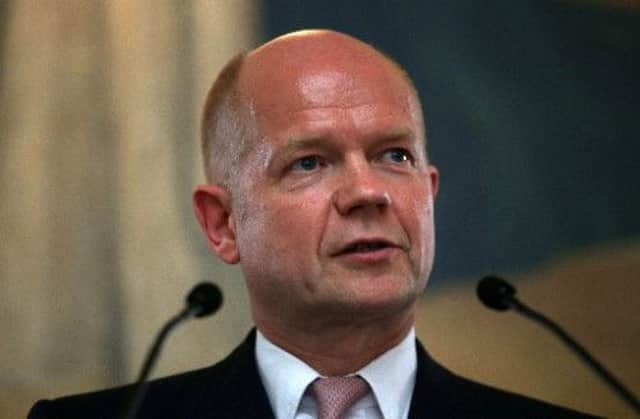‘Friends of Syria’ agree to supply rebels


Hague joined US secretary of state John Kerry among other countries including Germany, Jordan, Saudi Arabia and Qatar, at a meeting in Doha to discuss the crisis and said that “different countries would have different ways” of assisting the rebels in the civil war in Syria.
Each of the 11 members of the so-called Friends of Syria group of nations will “act in its own way” to support the rebels.
Advertisement
Hide AdAdvertisement
Hide AdHowever the UK stopped short of arming the rebels in a meeting that diplomatic sources said it hoped would “continue the momentum” of the recent G8 summit at Loch Erne in Northern Ireland.
In a statement issued after talks in Qatar, the ministers demanded the withdrawal of Hezbollah militias and fighters from Iran and Iraq who had sided with Assad’s regime.
All military support will be channelled through the Syrian Supreme Military Council, the foreign ministers agreed.
The communiqué issued following the Doha talks also called for fighters supporting Assad to be prevented from crossing into Syria from neighbouring counties.
The ministers also pledged to pursue “all appropriate avenues” at the United Nations to “support and protect the Syrian people”.
Hague said: “There’s been a very strong common sense of purpose among the 11 countries gathered here today, all desperately concerned about foreign intervention in Syria by Iran and by Hezbollah and by the seriousness of the humanitarian situation.
“I think the main things in common and agreed are that we’re all concerned about that humanitarian situation.
“The United Kingdom … is helping to lead the way with another £175 million contribution to the humanitarian situation.”
Advertisement
Hide AdAdvertisement
Hide AdHe echoed the words of Kerry at the meeting that “we’re all aiming to achieve a political solution, a political settlement, in Syria but that political settlement will not come about if the opposition can be destroyed by force”.
Hague said: “We have been talking about how we can help the opposition, how we can help save lives. Different countries will have different ways of doing that and I’ve made clear before how the United Kingdom is approaching that at the moment.
“We have to co-operate and we have to co-ordinate as much as possible to try to save the lives of innocent people in Syria.”
Ministers from Qatar, Saudi Arabia, the United Arab Emirates, Jordan, Egypt, Turkey, Germany, France, and Italy also attended the summit.
The ministers repeated their call for the establishment of a transitional governing body to which full executive powers would be transferred, which excluded “the central figures and associates whose hands are stained with blood”.
The communiqué said: “In this context, Bashar Assad has no role in the transitional governing body or thereafter.”
The document also called for United Nations inspectors to be granted full access to Syria to conduct an investigation into reported use of chemical weapons by Assad’s forces.
The Doha talks came as Syrian government forces stepped up their attack against rebel strongholds north of the capital Damascus, while opposition fighters launched their own offensive in the country’s largest city Aleppo.
Advertisement
Hide AdAdvertisement
Hide AdHowever the ministers refused to call for Assad to step down at the Doha meeting, which did not include the Russians at the negotiating table.
The war in Syria has so far claimed over 93,000 lives.
A recent declaration by the US that it had conclusive evidence that Assad’s regime used chemical weapons on a small scale against opposition forces prompted Washington to authorise the arming of rebels, a major shift in policy.
The UK has yet to follow suit.